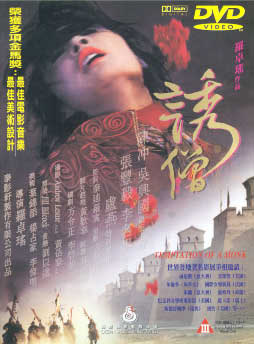Temptation of a Monk

Reviewed by YTSL
"Eat at the time to eat. Sleep at the time
to sleep. Die at the time to die". If these words seem nonsensical,
empty of much real meaning or plainly pretentious to you, especially when
you see them appear on screen at the point that they do in this absolutely
atypical Hong Kong film (which nonetheless was actually produced by Teddy
Robin Kwan!), then the chances are sky high that this 1993 Clara Law work
won't be at all to your liking. For my part, they suitably capped the
kind of cinematic experience that filled me with awe at the ability of the
filmmaker(s) to simultaneously (re)create a world unlike any this (re)viewer
had previously seen, yet endow it with enough understandable -- even if not
sympathetic -- situations and characters for me to emotionally connect with
as well intellectually comprehend.
Before anything else, let me point out that I
don't know much about the customs, ways of life, outfits, hairstyles and
particular histories of princes, princesses, other nobles, generals, other
military men and other denizens of the Tang Dynasty (618-906 A.D.).
Hence, I cannot judge whether the costumes, deportment and behavior of the
individuals depicted in TEMPTATION OF A MONK truly conform to those of actual
people who lived during that temporally distant period of Chinese history.
For the purposes of this film though, I'd hazard to suggest that perhaps
authenticity matters less here than the utilization of such elements to place
certain intriguing characters in incredibly visually fascinating settings
and dramatically interesting circumstances.

Although Joan Chen is its headlined star, and does have two roles in the
approximately two-hour length work (one as an imperial princess named Scarlet;
another as a woman who identifies herself as Violet, the widow of a general),
she actually is not its focus. Neither is it the Mainland Chinese superstar
actor, Zhang Fengyi (who has the part of General Huo Da, the politically
astute right hand man of the ambitious Prince Shi Min). Instead, TEMPTATION
OF A MONK's central character is portrayed by Wu Hsing Kuo, and he is absolutely
superb as the individual who is first viewed holding the position of highest
ranking commander of the Crown Prince's guards.

At least half an hour of film goes by before Wu's General Shi Yang Sheng
-- and five of his military, and not particularly pious, men -- opt to retreat
to a monastery. An additional fifteen minutes or so of this Category
III rated production unfolds before any monks are shown being exposed and
enticed to partake in such forbidden pleasures as meat consumption and the
viewing of all manners of performative entertainment as well as the naked
breasts of obviously loose women along with participation in the sex act
itself. From one point of view, it could be argued that all before
that which is signaled by a location shift that takes place about fifteen
minutes after the one hour mark -- and also the introduction of a fourth
not insignificant character (an elderly sprite of an Abbot played by Michael
Lee, who is given to make such observations as: "Here is here, there
is there, why use your heart to think?"!) -- is but a prelude to, and setting
up of, what may be considered to really matter.

However, this is not at all to say that nothing of note takes place prior
to that. Indeed, an alien looking dance performance (that would not
look out of place in a higher order sci-fi fantasy) that is part of a large-scale
formal ceremony with religious overtones, a post deer hunt meeting between
a couple of bloodied men and a noble woman and her entourage plus a fateful
conversation over an ostensibly friendly game of chess prove to be but well
staged and shot plot preludes for such as: Imperial fratricide condoned
by the father after he had been told by one son that the others had had adultery
with his favorite concubine; and the catalystic act of a mother (played by
Lisa Lu) that truly drives home an emotional point to -- as well as manages
to elicit a difficult promise from -- her well-meaning but consequently guilt-ridden
son.

Though its pace is mannered and style is most definitely "arthouse", the
generally austere feeling TEMPTATION OF A MONK certainly does have its share
of brutal and bloody actions (including decapitations), not just conversation,
monologues and meditations! Still, it was the less violent -- and indeed,
many of the non-verbal -- moments of this spellbinding film that had the
most impact on, as well as impressed, me. I'm not sure whether it's
Clara Law, co-cinematographers Arthur Wong and Andrew Lesnie or co-scriptwriters
Eddie Fong and Lillian Lee who most deserve credit for having a wonderful
eye for the kind of details that truly aid the overall presentation of an
unusual and ultimately moving story. Whoever it is, and especially
considering that he/she/they had but a paltry by Hollywood standards US$
3.5 million to work with, I reckon that we're talking about a dream factory
miracle worker (or two or more) here.

A couple of technical notes: 1) The subtitled translations appear to
be -- gasp! -- well nigh perfect; and 2) the blue tinge that envelopes the
bulk of the picture from when the tale moves to the setting of the more secluded
monastery apparently are part of Clara Law's stunningly singular visual conception.
My rating for the film: 8.5






